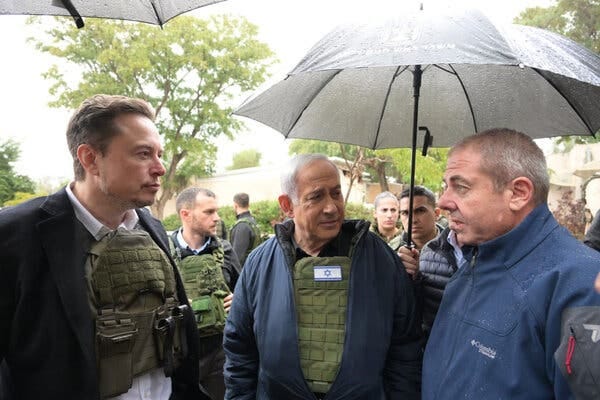Elon Musk in Israel, Meets Netanyahu
The visit also seen as an attempt to neutralize the recent anti-Semitic allegations against him.

Overview of the Visit
Elon Musk, the founder of SpaceX, today (Monday, November 27) met Israeli Prime Minister Benjamin Netanyahu during his visit to Israel. Their itinerary included a tour of the Kibbutz Kfar Aza, a site attacked by Hamas militants in its deadly incursion on October 7. This visit highlights Musk's interest in geopolitical issues and his increasing involvement in global affairs.
Experiencing the Aftermath of Conflict
During the tour, Musk was shown a video that documented the atrocities committed during the Hamas attack. He expressed his shock at the violence and condemned the intentional harm to civilians by Hamas militants. Musk emphasized the moral distinction between accidental civilian casualties, or even collateral damage, and the deliberate targeting of non-combatants, labeling the latter as evil.
Addressing Content Moderation Controversies on X
The visit coincided with Musk facing increasing criticism for loosening content moderation on X (formerly known as Twitter). Reports indicate a significant rise in anti-Semitic content on the platform since Musk's takeover. Despite these controversies, Musk did not directly address the allegations during his conversation with Netanyahu but stressed the need to counter propaganda that incites violence.
Starlink's Role in Gaza
A notable outcome of Musk's visit was the in-principle understanding reached with Israel for the operation of SpaceX’s Starlink satellites in Gaza. This decision is subject to Israeli approval, reflecting concerns about the potential misuse of this technology by Hamas. The implementation of Starlink in Gaza aims to alleviate communication blackouts and improve connectivity, although its exact operational framework remains unclear.
Controversies Surrounding Starlink
Starlink, known for providing internet in remote areas, has been involved in various geopolitical controversies. Its role in Ukraine's war against Russia and its reported use by dissidents in Iran highlight the complex implications of technology in conflict zones. Musk has stated his intent to avoid using Starlink for offensive military purposes, demonstrating an awareness of the ethical dimensions of his technological ventures.
Implications and Future Prospects
Elon Musk's visit to Israel and his discussions with Netanyahu underscore his growing influence in political and humanitarian issues. The integration of Starlink in conflict areas like Gaza presents both opportunities and challenges, reflecting the intricate relationship between technology and geopolitics. As Musk navigates these complexities, his decisions will likely continue to attract global attention and debate.




